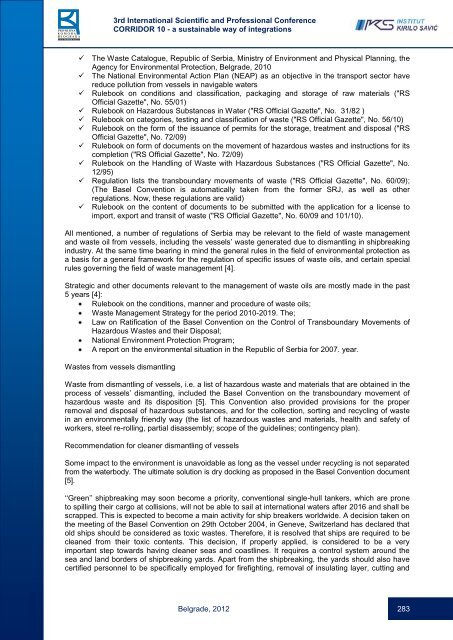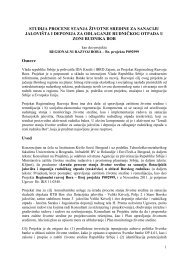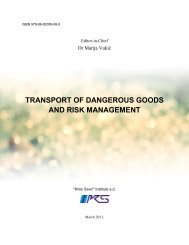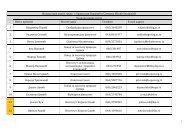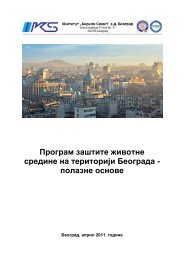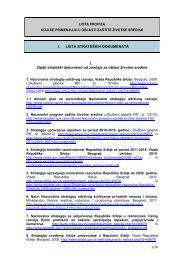Zbornik radova Koridor 10 - Kirilo SaviÄ
Zbornik radova Koridor 10 - Kirilo SaviÄ
Zbornik radova Koridor 10 - Kirilo SaviÄ
Create successful ePaper yourself
Turn your PDF publications into a flip-book with our unique Google optimized e-Paper software.
3rd International Scientific and Professional Conference<br />
CORRIDOR <strong>10</strong> - a sustainable way of integrations<br />
The Waste Catalogue, Republic of Serbia, Ministry of Environment and Physical Planning, the<br />
Agency for Environmental Protection, Belgrade, 20<strong>10</strong><br />
The National Environmental Action Plan (NEAP) as an objective in the transport sector have<br />
reduce pollution from vessels in navigable waters<br />
Rulebook on conditions and classification, packaging and storage of raw materials ("RS<br />
Official Gazette", No. 55/01)<br />
Rulebook on Hazardous Substances in Water ("RS Official Gazette", No. 31/82 )<br />
Rulebook on categories, testing and classification of waste ("RS Official Gazette", No. 56/<strong>10</strong>)<br />
Rulebook on the form of the issuance of permits for the storage, treatment and disposal ("RS<br />
Official Gazette", No. 72/09)<br />
Rulebook on form of documents on the movement of hazardous wastes and instructions for its<br />
completion ("RS Official Gazette", No. 72/09)<br />
Rulebook on the Handling of Waste with Hazardous Substances ("RS Official Gazette", No.<br />
12/95)<br />
Regulation lists the transboundary movements of waste ("RS Official Gazette", No. 60/09);<br />
(The Basel Convention is automatically taken from the former SRJ, as well as other<br />
regulations. Now, these regulations are valid)<br />
Rulebook on the content of documents to be submitted with the application for a license to<br />
import, export and transit of waste ("RS Official Gazette", No. 60/09 and <strong>10</strong>1/<strong>10</strong>).<br />
All mentioned, a number of regulations of Serbia may be relevant to the field of waste management<br />
and waste oil from vessels, including the vessels’ waste generated due to dismantling in shipbreaking<br />
industry. At the same time bearing in mind the general rules in the field of environmental protection as<br />
a basis for a general framework for the regulation of specific issues of waste oils, and certain special<br />
rules governing the field of waste management [4].<br />
Strategic and other documents relevant to the management of waste oils are mostly made in the past<br />
5 years [4]:<br />
Rulebook on the conditions, manner and procedure of waste oils;<br />
Waste Management Strategy for the period 20<strong>10</strong>-2019. The;<br />
Law on Ratification of the Basel Convention on the Control of Transboundary Movements of<br />
Hazardous Wastes and their Disposal;<br />
National Environment Protection Program;<br />
A report on the environmental situation in the Republic of Serbia for 2007. year.<br />
Wastes from vessels dismantling<br />
Waste from dismantling of vessels, i.e. a list of hazardous waste and materials that are obtained in the<br />
process of vessels’ dismantling, included the Basel Convention on the transboundary movement of<br />
hazardous waste and its disposition [5]. This Convention also provided provisions for the proper<br />
removal and disposal of hazardous substances, and for the collection, sorting and recycling of waste<br />
in an environmentally friendly way (the list of hazardous wastes and materials, health and safety of<br />
workers, steel re-rolling, partial disassembly; scope of the guidelines; contingency plan).<br />
Recommendation for cleaner dismantling of vessels<br />
Some impact to the environment is unavoidable as long as the vessel under recycling is not separated<br />
from the waterbody. The ultimate solution is dry docking as proposed in the Basel Convention document<br />
[5].<br />
‘‘Green’’ shipbreaking may soon become a priority, conventional single-hull tankers, which are prone<br />
to spilling their cargo at collisions, will not be able to sail at international waters after 2016 and shall be<br />
scrapped. This is expected to become a main activity for ship breakers worldwide. A decision taken on<br />
the meeting of the Basel Convention on 29th October 2004, in Geneve, Switzerland has declared that<br />
old ships should be considered as toxic wastes. Therefore, it is resolved that ships are required to be<br />
cleaned from their toxic contents. This decision, if properly applied, is considered to be a very<br />
important step towards having cleaner seas and coastlines. It requires a control system around the<br />
sea and land borders of shipbreaking yards. Apart from the shipbreaking, the yards should also have<br />
certified personnel to be specifically employed for firefighting, removal of insulating layer, cutting and<br />
Belgrade, 2012 283


